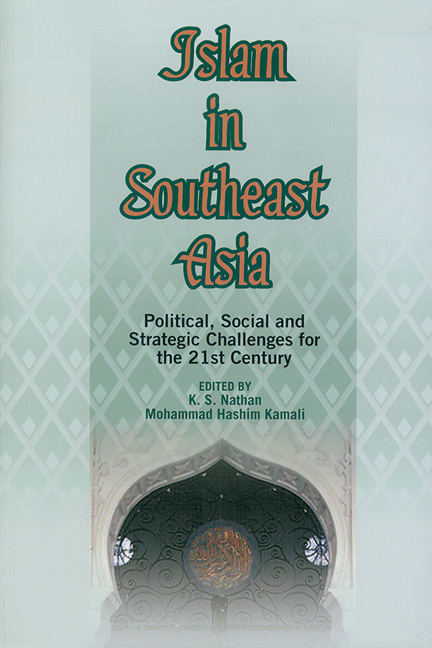Book contents
- Frontmatter
- Contents
- Preface
- Introduction: Understanding Political Islam Post-September 11
- PART ONE ISLAMIC DOCTRINE, HISTORY, GROWTH AND INSTITUTIONS IN SOUTHEAST ASIA
- PART TWO POLITICS, GOVERNANCE, CIVIL SOCIETY AND GENDER ISSUES IN SOUTHEAST ASIAN ISLAM
- PART THREE MODERNIZATION, GLOBALIZATION AND THE ‘ISLAMIC STATE’ DEBATE IN SOUTHEAST ASIA
- PART FOUR IMPACT OF SEPTEMBER 11 ON ISLAMIC THOUGHT AND PRACTICE
- 15 September 11 and Islamic Militancy in Post-New Order Indonesia
- 16 The Impact of September 11 on Islam in Southeast Asia
- CONCLUSION: Addressing the Challenge of Political Islam in Southeast Asia
- Note on Contributors
- About the Editors
- Index
15 - September 11 and Islamic Militancy in Post-New Order Indonesia
from PART FOUR - IMPACT OF SEPTEMBER 11 ON ISLAMIC THOUGHT AND PRACTICE
Published online by Cambridge University Press: 03 November 2017
- Frontmatter
- Contents
- Preface
- Introduction: Understanding Political Islam Post-September 11
- PART ONE ISLAMIC DOCTRINE, HISTORY, GROWTH AND INSTITUTIONS IN SOUTHEAST ASIA
- PART TWO POLITICS, GOVERNANCE, CIVIL SOCIETY AND GENDER ISSUES IN SOUTHEAST ASIAN ISLAM
- PART THREE MODERNIZATION, GLOBALIZATION AND THE ‘ISLAMIC STATE’ DEBATE IN SOUTHEAST ASIA
- PART FOUR IMPACT OF SEPTEMBER 11 ON ISLAMIC THOUGHT AND PRACTICE
- 15 September 11 and Islamic Militancy in Post-New Order Indonesia
- 16 The Impact of September 11 on Islam in Southeast Asia
- CONCLUSION: Addressing the Challenge of Political Islam in Southeast Asia
- Note on Contributors
- About the Editors
- Index
Summary
INTRODUCTION
On 11 September 2001, a tragedy occurred in the United States. Three jetliners hijacked by terrorists struck the World Trade Centre and the Pentagon, the principal symbols of American hegemony. Another hijacked jetliner tried to crash into the White House but failed, and plummeted into an open field in Pennsylvania. Within the space of twenty minutes, the twin towers of the World Trade Centre and part of the Pentagon collapsed, with the loss of more than three thousand lives. Mass hysteria and sorrow immediately afflicted not only American society, but also all civilized nations throughout the world. They strongly condemned the attacks and sent their sympathies to the victims. As an immediate response to the attacks, President George W. Bush proclaimed a “global crusade” against “terrorism”. He asked the entire world to join an anti-terrorist coalition, in order to defeat Osama bin Laden and his internationally operating terrorist network, Al Qaeda, which was accused of being responsible for the attacks. He even took a vow to retaliate by bombing Afghanistan, a country ruled by the Taliban regime and considered to have provided a haven for Osama bin Laden and his organization. From this tragedy, the world has apparently entered a new phase of global war, following the collapse of the Soviet Union and the end of the cold war.
Various effects have been produced by the September 11 tragedy and its aftermath. Direct reactions to the tragedy appeared in different parts of the world. In the West there emerged sporadic attacks against Muslim immigrants and their symbols of existence, indicating the increase of anti-Islam sentiment. Such a sentiment was intertwined with the fear of the threat of terrorism associated with Islam, exacerbated by the anti-terrorist campaigns by the United States. Similarly, in the Muslim world, reactions to September 11 arose in many places, but with different concerns, where protests against George W. Bush's proclamation of a global war were voiced. These reactions significantly correlated with the increase of anti-American sentiment in particular and the rise of Islamic radicalism in general. Witnessing these events, it is difficult to deny that the clash between the Western world and the Muslim world is somehow really legitimizing Huntington's thesis about the clash of civilizations.
- Type
- Chapter
- Information
- Islam in Southeast AsiaPolitical, Social and Strategic Challenges for the 21st Century, pp. 301 - 324Publisher: ISEAS–Yusof Ishak InstitutePrint publication year: 2005



